Quarterly Newsletter
Download printable version here
Picking Up the Pace in FY 2024
in FY 2024
Deena Speights-Napata, Executive Director
In the fall 2023 newsletter I reviewed the many achievements of the board during our last fiscal year. Now, let’s take a look at our next fiscal year: July 2023-June 2024:
- The board will be installing a new phone system designed to transfer calls more efficiently, have increased capacity to place callers on hold, possess greater degree of mobility while staff are talking with licensees and other customers on the phone, and will allow staff to telework while answering calls; and allow monitoring of calls to increase the accuracy of information exchange.
- The inspection staff will be increased by 20% to reduce the caseload for each inspector and increase the efficiency level and meeting time that occurs with each facility pharmacy manager and staff.
- The board will have a new network installed that will allow for more reliable internet service within the office and outside of the office while inspections are being conducted.
- Continued partnerships with MDH Agencies, including Medicaid provider Serves and PDMP to increase pharmacist enrollment as prescribers and increase use of CRISP and PDMP reports.
- Increase in pharmacist knowledge of drug supply chain illegal activity and potential impact on the integrity of pharmaceutical supply
- Increased analysis of data on pharmacy trends, including closures, relocations, and jurisdictional pharmacy presence.
- Providing more opportunities for dialogue with pharmacists, pharmacy technicians, pharmacy students, and pharmacy school deans on the changing environment of pharmacy practice and preparing for the future
READY…SET...LET’S GO!!
Veterans Auto and Education Improvement Act (VAEIA)
Licensed pharmacists and technicians from other states under military order to practice in Maryland are now allowed to practice in Maryland without a Maryland pharmacy license
On January 5, 2023, the President of the United States signed into law the VAEIA. This new federal law allows a service member (or their spouse), under military orders to serve in Maryland and licensed as a pharmacist or pharmacist technician in another state, to practice in Maryland without a Maryland license
The VAEIA requires that in order to practice in the state they are serving in, the service member (or spouse) must:
- provide a copy of their military orders to the licensing board in that state;
- remain in good standing in their original state of licensure and any other state they are licensed in;
- “submit to the authority of the licensing authority in the new jurisdiction for the purposes of standards of practice, discipline, and fulfillment of any continuing education requirements.”
The law also allows a licensed pharmacist or pharmacy technician who is the spouse of a service member the same allowance under the same requirements. The authority to practice in Maryland without a license lasts for as long as the service member is stationed in Maryland (for the spouse of a service member, divorce would also terminate the recognition to practice in Maryland).
Expanding the Scope of Work for Pharmacy Technicians –– Final Product Verification
The Board of Pharmacy has proposed new regulations designed to expand the scope of certain registered pharmacy technicians and enable pharmacists to spend more time performing clinical functions. The proposed regulations were discussed during numerous public meetings, including September 2017, August 2020, and, most recently, October 2023. The proposed regulations were published in the June 2023 edition of the Maryland Register. After receiving and considering public comments, the Board voted to move toward final adoption of the proposed regulations. As of the date on which this article is published, the regulations are not yet in effect. The intent of this article is to provide a summary of the proposed regulations; please refer directly to the text of the regulations in the Maryland Register for complete information.
Q: What is “final product verification?”
A: Confirming the
- accuracy of a device or drug product, and
- dosage form of a filled prescription or medication order.
Confirming the
- accuracy of a device or drug product, and
- dosage form of a prescription or medication selected for stocking into a medication distribution system.
Q: How is final product verification different from the final accuracy check?
A: Final product verification does not include determining the appropriateness of a prescription, dosage form, directions for use, labeling, packaging, or any other determination that requires the application of a pharmacist’s clinical expertise. Final product verification is one mechanical component of the overall product verification process; however, it does not replace the pharmacist’s final accuracy check.
Q: What are pharmacy system requirements to allow validated pharmacy technicians to perform final product verification?
A: A licensed pharmacist may delegate final product verification to a pharmacy technician provided bar code scanning technology is used during the filling process and at the verification step to validate selection accuracy.
Q: Are there any prescriptions for which a licensed pharmacist may not delegate the task of final product verification?
A: Yes, a pharmacist is prohibited from delegating the final product verification of a compounded medication.
Q: Who qualifies to serve as a validated pharmacy technician?
A: A registered pharmacy technician who has
- one year of experience in Maryland, and
- a product verification certificate issued by an approved technician certification program.
Q: Once a registered pharmacy technician has accumulated the required experience and certificate, what form must the individual submit to the Board.
A: Notification or application to the Board is not required; however, an employer or supervising pharmacist should request documentation of experience and a copy of the pharmacy technician’s final product verification certificate in order to permit a registered pharmacy technician to function as a validated pharmacy technician.
Q. What documentation must a pharmacy maintain in order to staff a validated pharmacy technician?
A. A pharmacy must maintain a current list of validated pharmacy technicians on staff, job descriptions for each technician, and standard operating procedures for the use of validated pharmacy technicians.
Q. What are the responsibilities of a supervising pharmacist of a validated pharmacy technician?
A. Similar to any other delegated pharmacy act, the supervising pharmacist must directly supervise the validated pharmacy technician, and shall only delegate acts that are within the competency of the technician.
![]() Prescription Drug Monitoring Program (PDMP) Resource Documents
Prescription Drug Monitoring Program (PDMP) Resource Documents
The Maryland Office of Provider Education and Regulation - Prescription Drug Monitoring Program (OPER-PDMP) has recently created several resource documents specifically to support pharmacists when dispensing controlled substances. During a focus group consisting of pharmacists from various practice settings, OPER-PDMP received feedback that there is a need for additional resources to support pharmacists when dispensing opioids and other controlled substances, particularly independent pharmacies. All of the newly created and updated clinical resources can be found on the clinical resources page of the
PDMP website.
The
Opioid Safety Guide, is a guide for community pharmacists that provides easy access to best practices for dispensing prescribed opioids, guidance for naloxone distribution, and helpful tips to register and use CRISP. We would like to thank Deena Speights-Napata, the Maryland Board of Pharmacy Executive Director, and the Pharmacy Inspectors for their help to ensure that this guide addressed the most common controlled substance topics of concern identified during pharmacy inspections.
The
Pharmacist CRISP Clinical Access Fact Sheet provides information on how pharmacists can gain access to valuable clinical information through the CRISP Portal. CRISP is Maryland’s designated statewide Health Information Exchange (HIE) and Maryland’s PDMP vendor. Pharmacies can gain access to the HIE through the CRISP Portal after completing the steps outlined in the Fact Sheet. HIE access allows the pharmacists to see relevant clinical information such as non-fatal overdose alerts and other clinical information that can help with care coordination and preventing adverse events.
If there are any additional topics that you think it would be helpful for the PDMP to address, please reach out to
[email protected]
Continuing Education Breakfast 2023
The annual Continuing Education Breakfast met in person at a new venue this year, the BWI Airport Marriott, in Linthicum Heights. This event is offered to give licensees an opportunity to hear excellent speakers while receiving nationally certified credit at an inexpensive cost. The event is planned by the Public Relations Committee of the Board of Pharmacy.
The event opened with Deena Speights-Napata, Executive Director of the Maryland Board of Pharmacy, providing a brief introduction. After the meeting was opened, Dr. Javier Vázquez, Board member and Chair of the Public Relations Committee, introduced each presenting speaker.
The first speaker was Dr. Melissa Augustino, Associate Director of Pharmacy for Quality, Regulatory, and Medication-Use Systems at the Hospital of the University of Pennsylvania. Dr. Augustino presented an introduction to patient safety concepts and their relation to medication error prevention. Presenting next was Dr. Tiffany Buckley, faculty member for the Master of Science in Medical Cannabis Science and Therapeutics at the University of Maryland School of Pharmacy. Dr. Buckley discussed clinical practice considerations for pharmacist who provide care to adults who use cannabis.
![]() Every Continuing Education Breakfast, the Maryland Board of Pharmacy recognizes the licensees who have held a pharmacist license for 50 years or more. Each licensee receives a citation from the governor, thanking them for their service. The citations were presented by the Board’s Executive Director, Deena Speights-Napata. This year we recognized the 2023 recipients. In attendance at the ceremony were six licensees: Cynthia Boyle, Arnie Clayman, Lisa Ann Dudley, Joseph Marrocco, Mark Miller, and Steve Silverman. One was also in attendance via the webinar: Ellen Yankellow.
Every Continuing Education Breakfast, the Maryland Board of Pharmacy recognizes the licensees who have held a pharmacist license for 50 years or more. Each licensee receives a citation from the governor, thanking them for their service. The citations were presented by the Board’s Executive Director, Deena Speights-Napata. This year we recognized the 2023 recipients. In attendance at the ceremony were six licensees: Cynthia Boyle, Arnie Clayman, Lisa Ann Dudley, Joseph Marrocco, Mark Miller, and Steve Silverman. One was also in attendance via the webinar: Ellen Yankellow.
Following this ceremony, two wonderful speakers presented information on how to develop practice-ready pharmacy workforce. Dr Agnes Ann Feemster, Assistant Dean of Experiential Learning and an Associate professor in the Department of Practice, Sciences, and Health Outcomes Research at the University of Maryland School of Pharmacy, along with Dr. Amy Ives, who is the Director of Skills-Based Laboratory Instruction and an Associate Professor in the Department of Practice, Sciences and Health Outcomes research at the University of Maryland School of Pharmacy. Dr Feemster and Dr. Ives shared their experiences and best practices when precepting learners that help promote the development of their professional identity and described how to foster their skills to become practice-ready.
Dr. Meghan Swarthout, Director of Pharmacy Patient Care Services and Population Health for the Johns Hopkins Health System, closed out the excellent lineup of speakers. She spoke about how each of us can engage in advocacy in a meaningful way. Dr. Swarthout took the opportunity to describe the role of the Maryland Pharmacy Coalition in pharmacy advocacy in our State and discussed pharmacy-related legislation considered in the 2023 Legislative session. The presentation ended with a call to action and describing ways to be an effective advocate for our profession. A note of thanks to Aliya Horton, Executive Director for the Maryland Pharmacists Association for the development of the content and slides for this session.
Executive Director Deena Speights-Napata closed out the Continuing Education Breakfast with a reminder about how to obtain the credits for the event. Thanks to all who attended and participated in the discussion. See you next year!
Attendees at the Continuing Education Breakfast
|
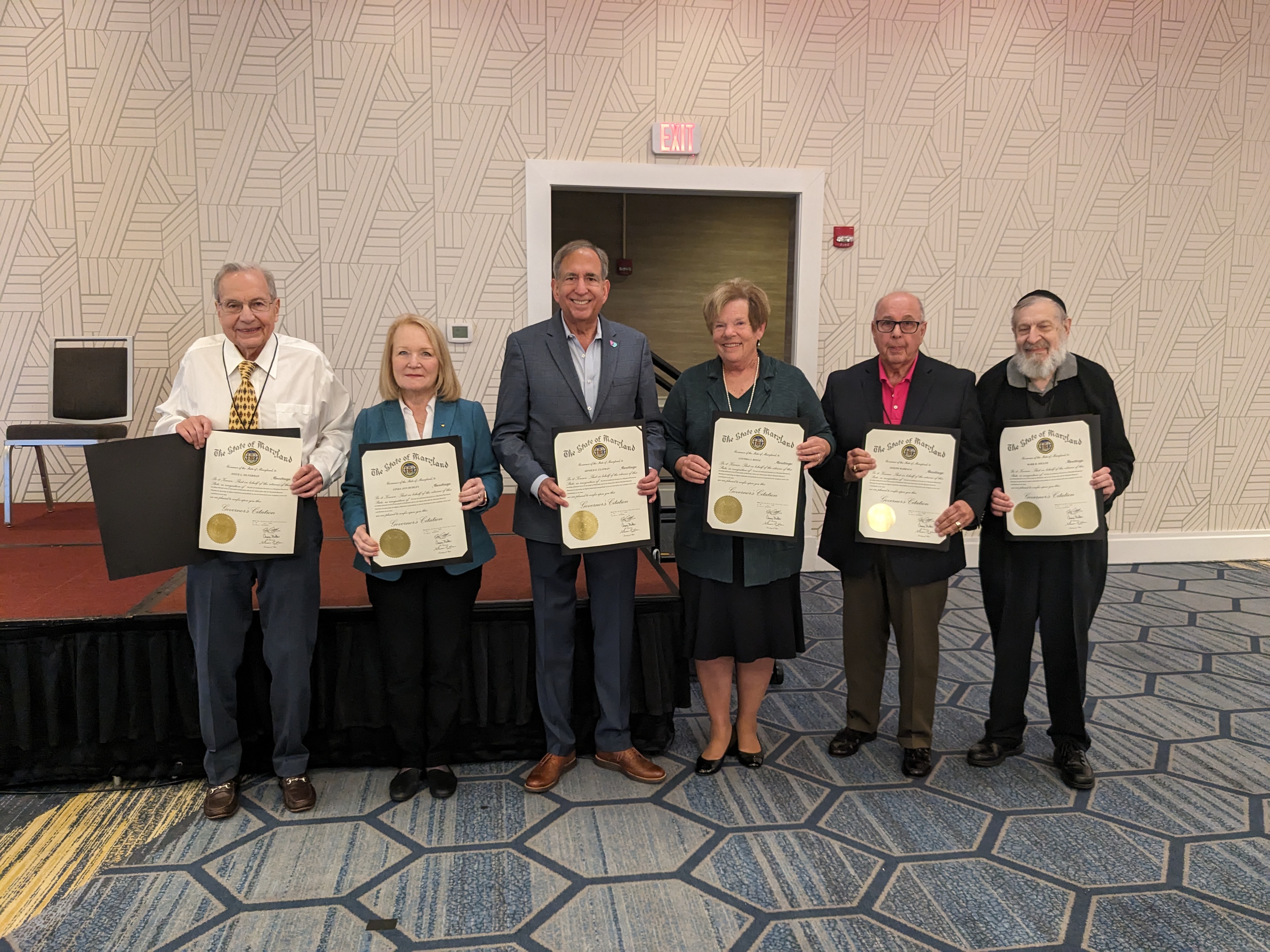
50 year pharmacists, from L to R: Steve Silverman, Lisa Ann Dudley, Arnie Clayman,
Cynthia Boyle, Joseph Marrocco, and Mark Miller
|
Prescribing Practitioner Enrollment in Medicaid
At The Maryland Board of Pharmacy board meeting held on November 15,2023 the Maryland Department of Health Office of Medicaid Provider Services and the Office of Pharmacy Services presented an important update on Medicaid provider enrollment policy.
Beginning January 3, 2024, in order for states to comply with the federal Affordable Care Act requirements, Medicaid programs must deny any pharmacy claim in which the prescriber is not actively enrolled in Medicaid.
Current policy implementation applies to Fee-For-Service (FFS) claims only.
● Phase 1 Denials: (January 2024) Medicaid will deny pharmacy claims for non-behavioral health drug classes if the prescriber is not enrolled. “AS OF JANUARY 3, 2024, CLAIMS WILL DENY FOR UNENROLLED PRESCRIBERS. PRESCRIBER MUST ENROLL WITH MEDICAID."
● Phase 2 Denials: (July 2024) Medicaid will deny ALL pharmacy claims regardless of drug class if the prescriber is not enrolled
Prescriber Enrollment Options
An individual practitioner may enroll as either: 1) A fully participating (billing or rendering) provider; or 2) An ORP-only Provider - Does not bill for services or sign a full Provider Agreement.
Provider Resources
Prescribers must enroll via ePREP.
● Contact the ePREP hotline for help with applications: 1-844-463-7768.
Enrollment guidance and training: https://health.maryland.gov/mmcp/provider/Pages/eprepresources.aspx
Send ORP enrollment policy questions to [email protected].
Event Corner: Notre Dame of Maryland University School of Pharmacy POD Exercise
On October 10, 2023 ten members from the BOP Emergency Preparedness Task Force (EPTF) conducted a Point of Dispensing (POD) Drill in the gymnasium of the Notre Dame of Maryland University School of Pharmacy.
PODs are where the public would go to receive prophylactic medications/vaccines in the event of an emergency. The scenario employed by the EPTF at Notre Dame Drill involved treating the public after the release of Anthrax by terrorists.
This year's drill, organized by EPTF member Larry Hogue, was a significant step forward as it was the first time at a Maryland School of Pharmacy QR codes and Mobile Technology were used for Medication Screening Form completion at a POD Drill. The drill involved approximately 140 student pharmacists and student nurses. EPTF members worked closely with Notre Dame faculty, who would take the lead if an actual POD activation were to occur, to familiarize them with POD concepts, infrastructure and operations.
Thanks go to Notre Dame Dean Matthew Shimoda for his encouragement and strong support, Kim Eshleman and Joe White from the Baltimore City Health Department for their engagement and especially Thomas Franklin from the Howard County Health Department who was instrumental in creating the app that was accessed on the “patients" mobile devices. By all accounts this activity was deemed a success and Dean Shimoda has already invited the EPTF back for next fall to conduct another drill.
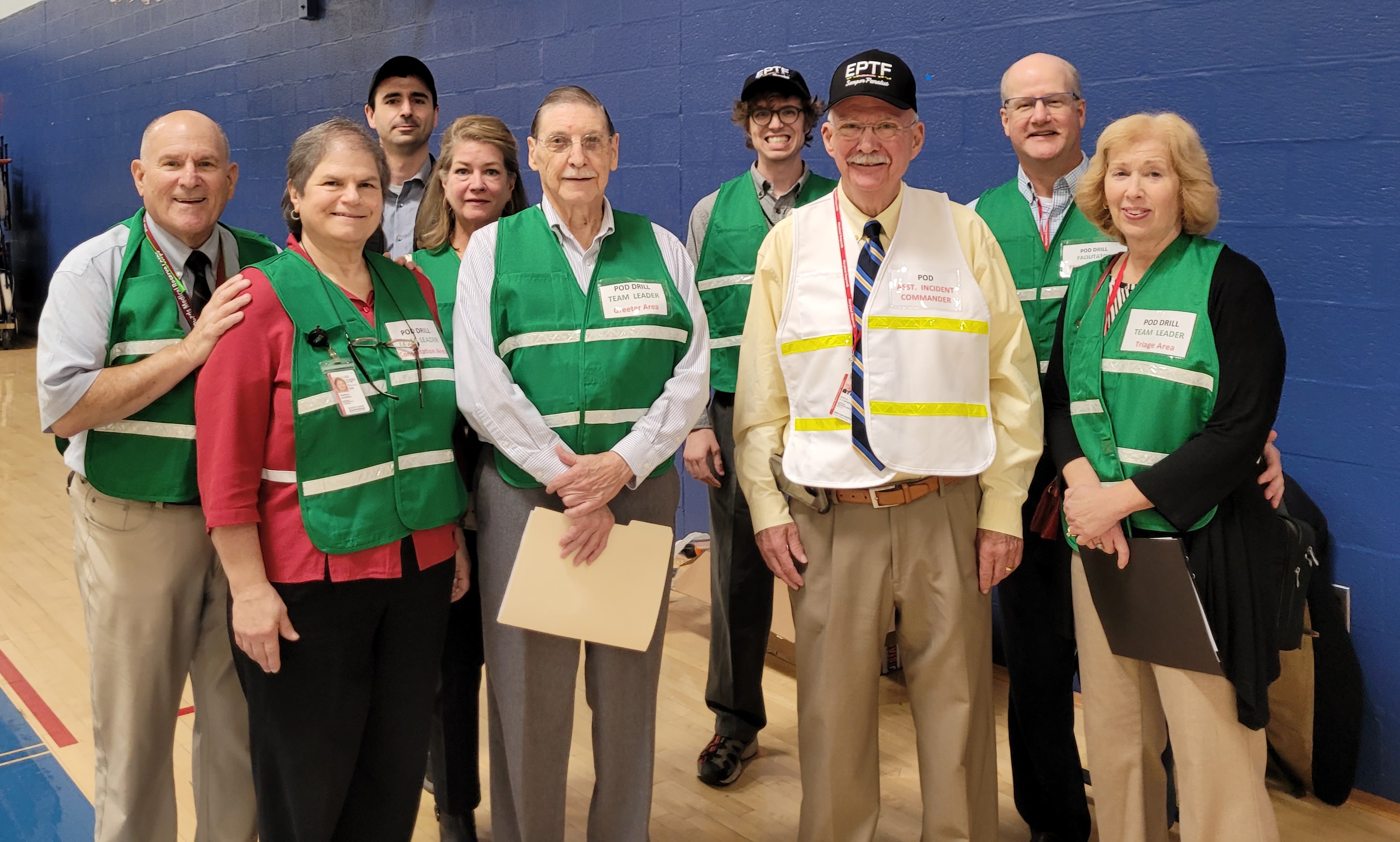
L to R: EPTF Members Arnie Honkofsky, EPTF Co-Chair Jen Thomas, Ryan Boasi, Cynthia Anderson, Don Taylor, Leo Gray, Larry Hogue, Raymond Palasik, Kimberly Palasik
|
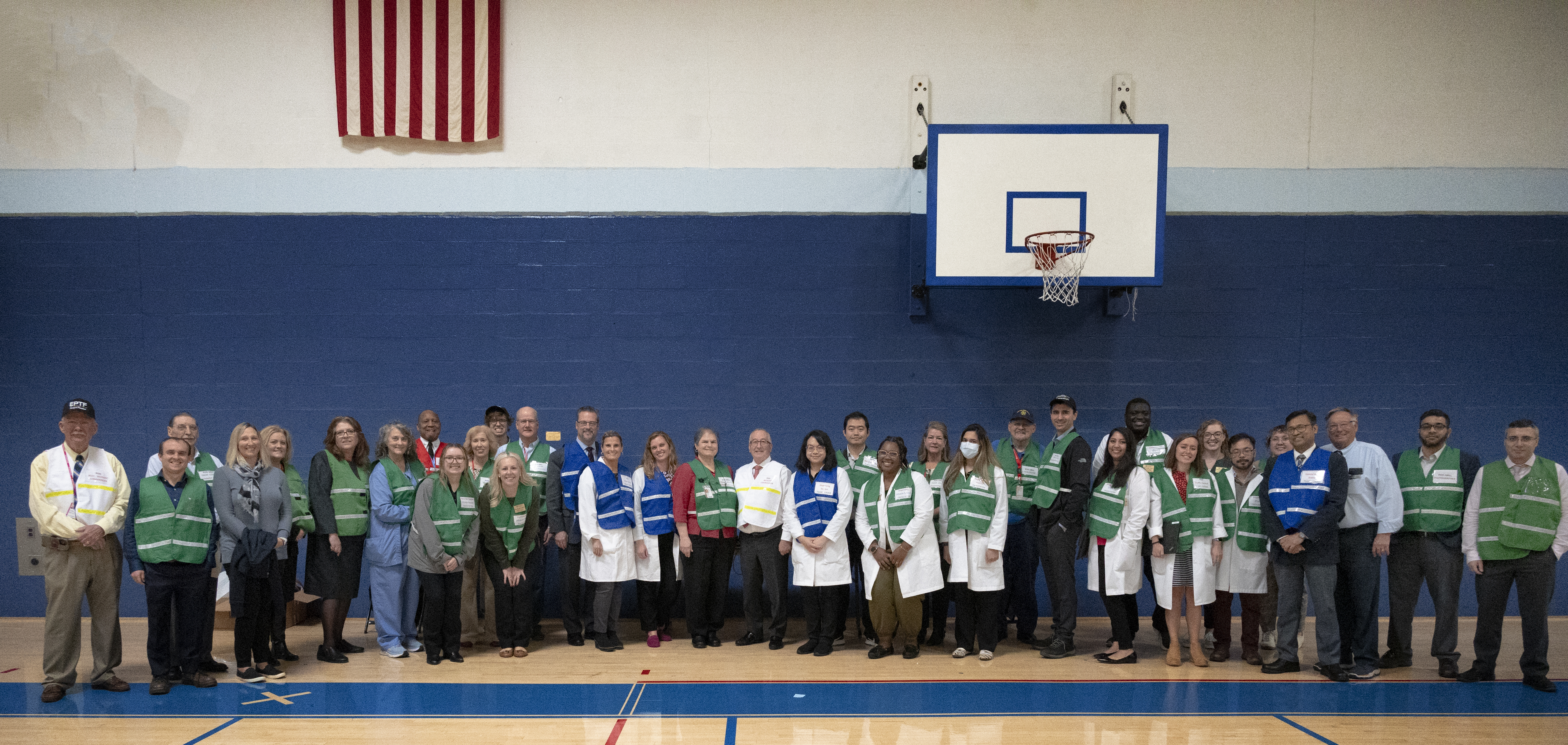
Notre Dame Professors and staff, Emergency Preparedness Taskforce, Representatives from Howard County and Baltimore City Health Depts.
|
UMES 10th Annual Point-of-Dispensing (POD) Drill for Students' Training on Disaster and Emergency Preparedness and Response
Hoai-An Truong, PharmD, MPH, FAPhA, FNAP, Professor, Director of Public Health, School of Pharmacy and Health Professions, University of Maryland Eastern Shore
In a continued effort to increase awareness of disaster and emergency preparedness training for future generations of pharmacists and other healthcare professionals, University of Maryland Eastern Shore (UMES) School of Pharmacy and Health Professions celebrated National Preparedness Month in September 2023 with the 10th Annual Point-of-Dispensing (POD) drill on September 12, 2023 as a sustained collaboration with the Somerset County Health Department (SCHD) and with support from the Maryland Board of Pharmacy Emergency Preparedness Task Force (EPTF), the Maryland Department of Health – Office of Preparedness and Response (OPR), and the Eastern Shore Collaborative for Interprofessional Education (ESCIPE). Special thanks to SCHD – Danielle Weber and Christopher Osment, from EPTF – Jennifer Thomas, Don Taylor and Cynthia Anderson, and from OPR – Christopher Kozub.
Historically, the POD drill exercise was inaugurated in 2013 and continued through 2019 with a focus on mass prophylaxis or dispensing of ciprofloxacin and doxycycline for anthrax. This was a seven-year collaborative partnership of the above-mentioned groups that enabled faculty to convert to virtual POD drill in 2020-2021, as well as prepare students for volunteer roles at mass vaccination clinics during the COVID-19 pandemic. Ongoing interprofessional collaboration among faculty in medical laboratory science, nursing, pharmacy, physical therapy, physician assistant, and respiratory therapy brought together about 100 students for preparedness and response training. This 2023 real-world application- or skills-based training focused on a mass vaccination clinic for the influenza vaccination. Students exchanged roles as providers versus patients in two rounds and rotated through five stations, including: greeting, registration, consultation, vaccination, and observation. Students also received just-in-time-training, which occurred immediately prior to the start of the drill exercise for all students. Overall, it was a positive real-world experience for all those involved and increased awareness among students for disaster and emergency preparedness and response.
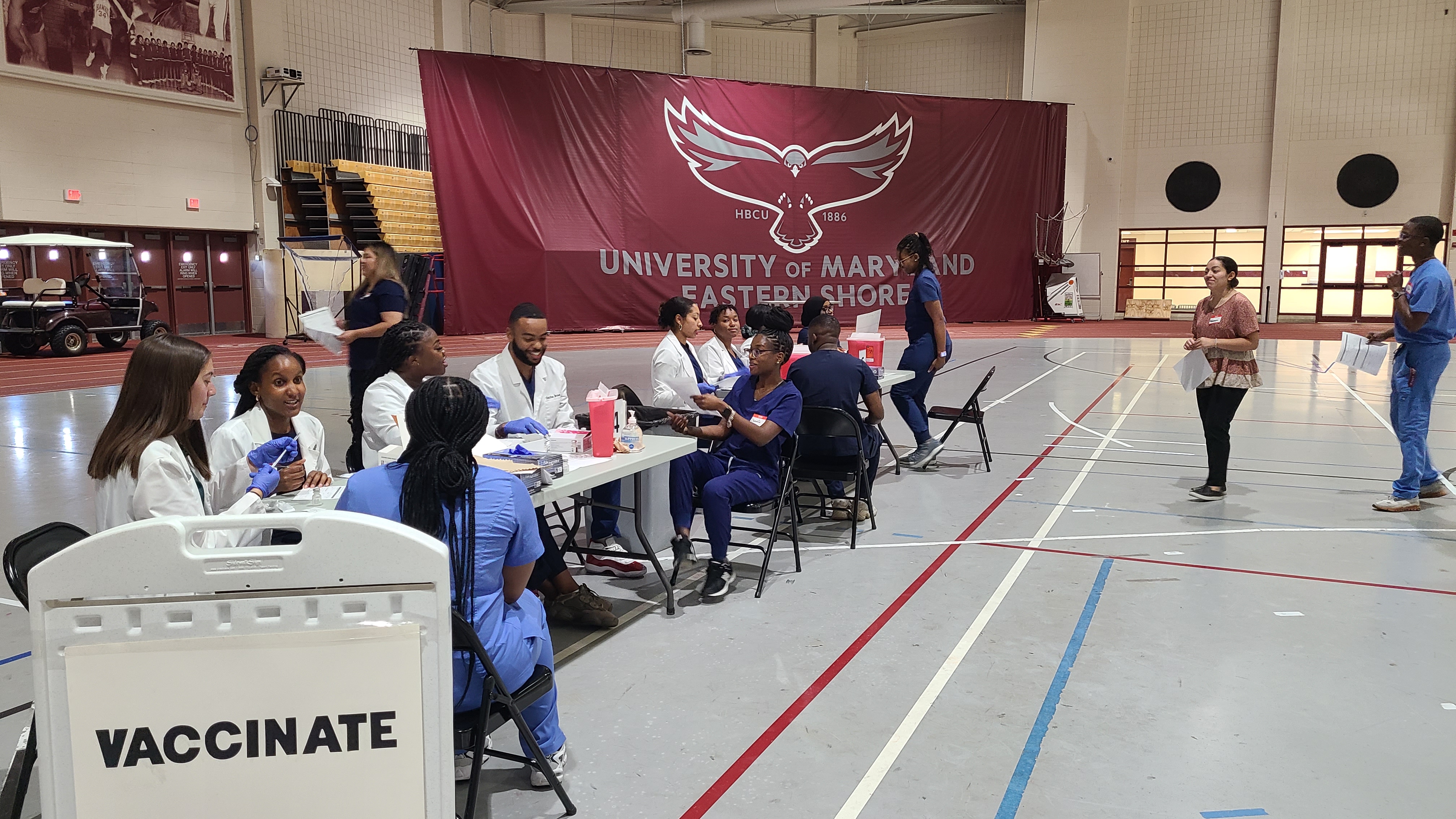
UMES students active in the POD
|

Students and staff of UMES, with Emergency Preparedness Taskforce
|
Inspection Trends- Second Quarter 2023
The Maryland Board of Pharmacy investigates complaints that come to the Board from various sources. Complaints may come from consumers, healthcare professionals, pharmacy boards outside of Maryland, federal agencies, OCSA and from Board inspections of pharmacies, sterile compounding facilities, and distributors in Maryland. The Board requires that all pharmacies be inspected, at a minimum, on an annual basis and distributors be inspected on a biannual basis.
The following represents a breakdown of the issues that have come to the Board from the inspection of pharmacies across the state in the second quarter of 2023.
-
CDS Red Flag
- Invalid/Expired CPR Certifications
- Documents Requested But Not Provided
- C-II Audit Narcotic Discrepancies
- Expired Medications
- Medication Storage Issues
- No Approved Technician Training Program
- Not Open During Pharmacy Hours
- Sterile Compounding Issues
- Unauthorized Personnel
- Pharmacy Closed without Notification
- Pharmacy Signage Not Removed
Disciplinary Actions
Pharmacists
| LIC. # | SANCTION | DATE
|
Edward Breslow
| 22547
| Revocation
| 7/19/2023
|
Edwin D. Allen, Jr.
| 25395
| Probation
| 8/7/2023
|
Kendra N. Fox
| 22740
| Reprimand
| 9/19/2023
|
Kyle Tang
| 25521
| Summary Suspension
| 9/27/2023
|
Sun Park
| 10586
| Summary Suspension
| 10/20/2023
|
Pharmacy Technicians | LIC. #
| SANCTION | DATE |
Katrice Matthews
| T01945
| Revoked
| 8/30/2023
|
David Nguyen
| T24720
| Reinstatement Denied
| 9/26/2023
|
| Candice Exum | T12854
| Summary Suspension
| 10/24/2023
|
Establishments | LIC # | SANCTION | DATE |
Westchester Compounding, Inc.
| P08617
| Fine
| 8/15/2023
|
Board Commissioners Ellen H. Yankellow and Efstratios Bouyoukas Recognized by the Maryland Department of Health for their Years of Service
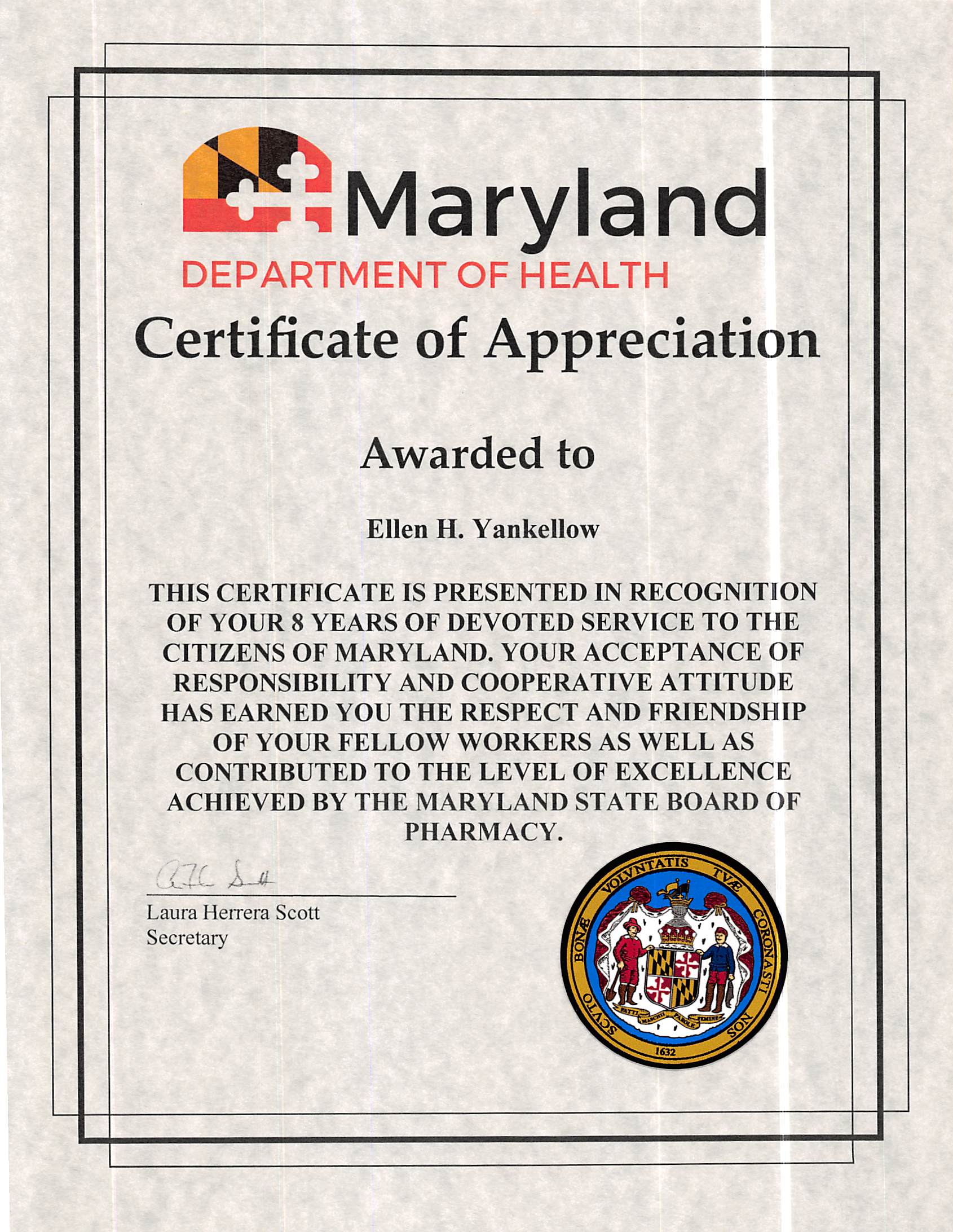
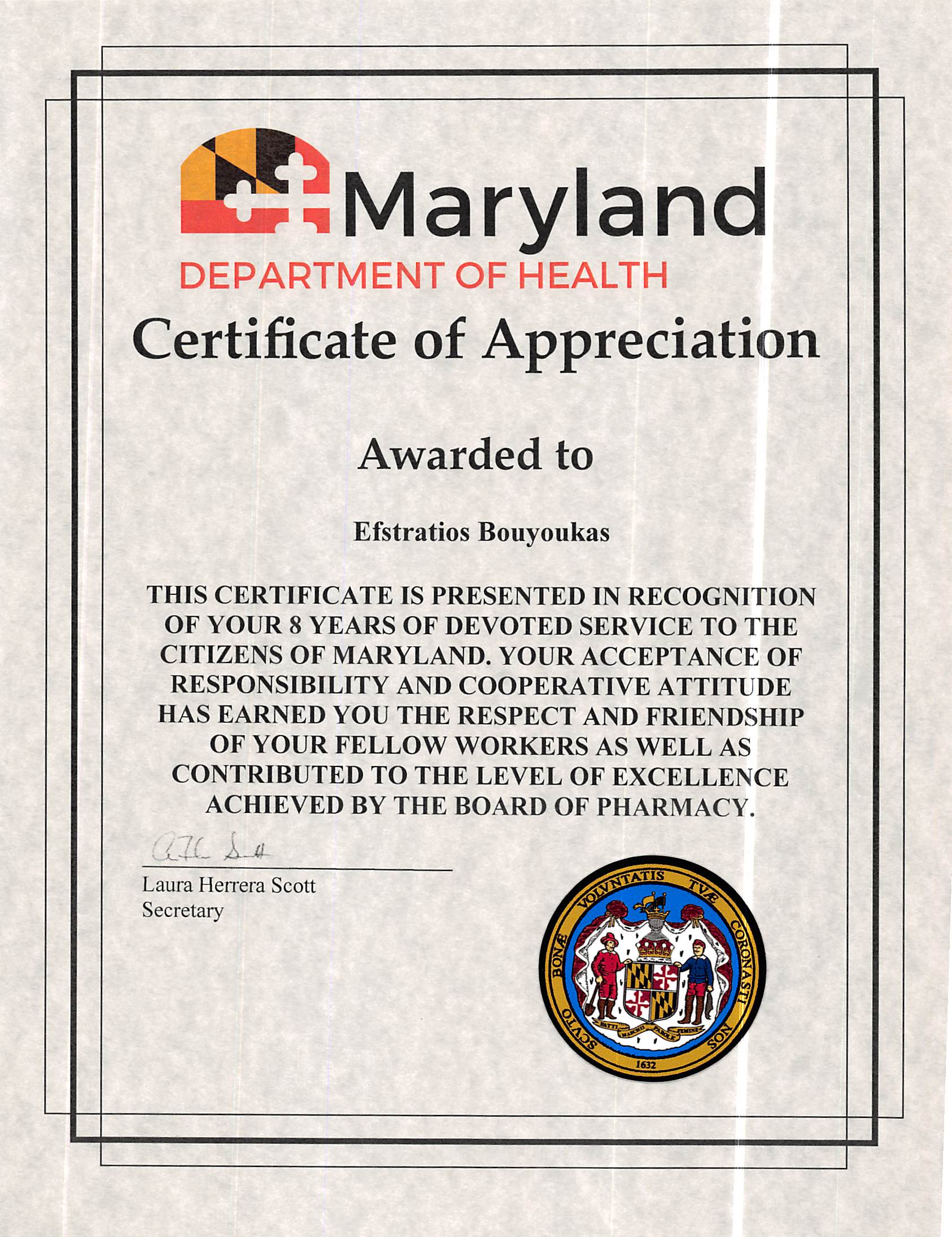
The Maryland Department of Health Acknowledges Board of Pharmacy Staff Year of Service
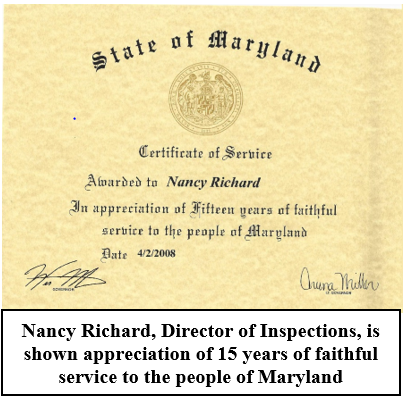
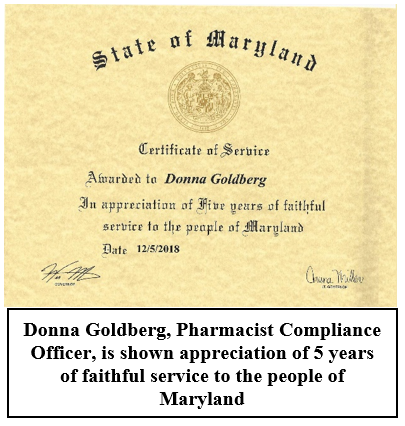
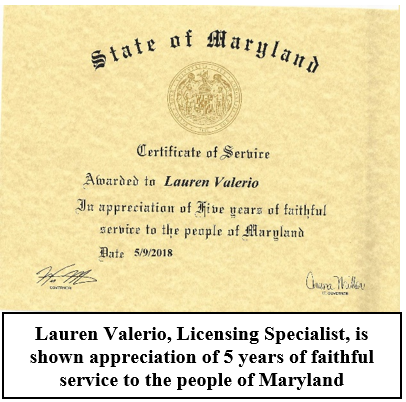

National Association of Boards of Pharmacy
National Pharmacy Compliance News
Reprinted from the National Association of Boards of Pharmacy FOUNDATION
FDA Delays Enforcement of Certain DSCSA Requirements Until November 2024
Food and Drug Administration (FDA) has published
final guidance delaying enforcement of certain Drug Supply Chain Security Act (DSCSA) requirements until November 27, 2024. The extension will give trading partners (drug and device manufacturers, wholesale distributors, dispensers, and repackagers) additional time to further “develop and refine appropriate systems and processes to conduct interoperable, electronic tracing at the package level, to achieve robust supply chain security under the DSCSA while helping ensure continued patient access to prescription drugs," the agency said in the guidance. FDA does not intend to take action to enforce the requirements under Section 582(g)(1)(B) of the Federal Food, Drug, and Cosmetic Act as long as the product is introduced in a transaction into commerce by the product's manufacturer or repackager before November 27, 2024. The final guidance will not impact NABP's plans for providing DSCSA education to its member boards and trading partners, nor will it impact the launch of
Pulse by NABP™.
ISMP Launches the 2023-24 Targeted Medication Safety Best Practices for Community Pharmacy
This column was prepared by the Institute for Safe Medication Practices (ISMP), an ECRI affiliate. Have you experienced a medication error or close call? Report such incidents in confidence to ISMP's National Medication Errors Reporting Program online at www.ismp.org or by email to [email protected] to activate an alert system that reaches manufacturers, the medical community, and Food and Drug Administration (FDA). To read more about the risk reduction strategies that you can put into practice today, subscribe to the ISMP Medication Safety Alert! newsletters at www.ismp.org.
The Institute for Safe Medication Practices (ISMP) has launched the 2023-24 Targeted Medication Safety Best Practices for Community Pharmacy (Best Practices). The purpose of these Best Practices is to identify, inspire, and mobilize widespread, national adoption of consensus-based best practices in community pharmacies to address recurring problems that continue to cause fatal and harmful errors, despite repeated warnings. These best practices, which are reviewed by an external expert advisory panel, represent high-leverage error-reduction strategies, many of which have already been successfully adopted by some pharmacies. While Best Practices might be challenging for some organizations to achieve, they are designed to be practical and realistic. Their value in reducing medication errors is grounded in scientific research and expert analysis of medication errors and their causes. Their implementation can vastly improve medication safety and reduce the risk of significant patient harm.
Each best practice is accompanied by a rationale and references, as well as related issues of ISMP's newsletters for additional background and information. While targeted to the community pharmacy setting, some best practices are also applicable to other health care settings, such as ambulatory, mail order, specialty pharmacy, long-term care, and home infusion.
The 2023-24 Targeted Medication Safety Best Practices for Community Pharmacy include the following:
- Use a standard protocol to verify a patient's identity, utilizing at least two patient identifiers, when receiving a prescription to be filled, responding to patient-specific questions, providing filled prescriptions to patients at the point of sale, when delivering prescriptions to the patient's home, and prior to administering vaccines or other treatments.
- Install and use barcode verification during production (ie, the prescription-filling process) to scan each drug or vaccine package or container (eg, bottle, carton) used to fill a prescription, including manufacturer cartons or bottles that may be dispensed to a patient.
- Use a weekly dosage regimen default for oral methotrexate in electronic systems when medication orders are entered. Require verification and entry of an appropriate oncologic indication in order-entry systems for daily orders. Create a forcing function (for instance, an electronic stop in the sales register that requires intervention and acknowledgment by a pharmacist) to ensure that every oral methotrexate prescription is reviewed with the patient or a family member when a prescription is presented or refills are processed. Provide specific patient and/or family education for all oral methotrexate prescriptions.
- Standardize the use of the milliliter (mL) unit of measure when prescribing, dispensing, and measuring oral liquid medications.
- Seek out and use information about medication safety risks and errors that have occurred in organizations outside of your pharmacy, including other affiliated pharmacies, and take action to prevent similar errors.
To best protect public health, ISMP encourages all United States community and ambulatory care pharmacies to focus their medication safety efforts for the next two years on these
Best Practices. The
Best Practices are fully described on
ISMP's website. In addition, there is a
worksheet that pharmacies can use to identify gaps in implementation of the
Best Practices and develop an action plan to address vulnerabilities. Pharmacies can also view a recording of the NABP educational session
Exploring Medication Safety: New ISMP Best Practices for Community Pharmacy to learn more about the new
Best Practices.
FDA Warns of Fraud Pertaining to Distribution of Ozempic, Other Medications
Food and Drug Administration's (FDA's) Office of Criminal Investigations has identified cases where wholesalers (licensed and unlicensed) are offering to sell Ozempic® with large discounts. In some instances, the investigation has revealed it to be a “No-Delivery Scheme," where the purchaser would make payment and not receive the product. In other instances, the product offered for sale is diverted from foreign countries or counterfeit. In some of the transactions currently under investigation, it is suspected that the sellers are involved in account takeover, in which they obtain the licensing, management, and location information from licensed wholesalers and pretend to be employees of such companies. This information is easily accessible online.
The sellers offer sufficient information and documentation to give the appearance that the transaction is legitimate. These transactions often require full or partial payment up front via wire transfer, non-disclosure agreements, establishment of purchase accounts, and on occasion, have involved fraudulent transaction statements (old pedigree). In some cases, the offer comes from a company that doesn't distribute temperature-controlled drug products. It is important to verify the legitimacy of the offer and that the company offering the product for sale and distribution actually distributes Ozempic or other semaglutide drug products.
FDA is also investigating the sale of semaglutide and tirzepatide online. It appears that most of the products offered for sale are counterfeits imported from China. These products, however, are not made to look like legitimate Ozempic pens; they are sold in the form of injectable vials and labeled as semaglutide.
Lastly, FDA has identified several companies importing a salt form of semaglutide (semaglutide sodium and acetate) for distribution and sale to compounding pharmacies. FDA issued guidance indicating the salt form of semaglutide is prohibited from use in compounding human drugs. This bulk active pharmaceutical ingredient is purchased and distributed to compounding pharmacies that then compound semaglutide pursuant to individual prescriptions and in bulk, which has resulted in patients suffering adverse events.
This illicit activity has been detected at both the distributor and pharmacy levels of our supply chains. Any pharmacy that has been approached about the purchase/distribution of Ozempic, semaglutide, tirzepatide, or the salt form of semaglutide (and they haven't spoken to the Healthcare Distribution Alliance Pharmaceutical Cargo Security Coalition already) is advised to contact Chuck Forsaith at
[email protected] or 401/623-1344.
Final Guidance for Trading Partners to Adopt Secure Electronic Data Exchange System Released by FDA
Food and Drug Administration (FDA) has released a final guidance clarifying the necessary standards to adopt secure, interoperable electronic data exchange among the pharmaceutical distribution supply chain. Specifically, the
DSCSA Standards for the Interoperable Exchange of Information for Tracing of Certain Human, Finished, Prescription Drugs – Guidance for Industry document offers recommendations for trading partners to adopt the Electronic Product Code Information Services standard to manage transaction information and transaction statements. The document finalizes the revisions added to the July 2022-issued document of the same title. The document can be accessed via the Regulatory Information section of FDA's website.
Over 99% of Health Care System Pharmacists Surveyed Report Experiencing Drug Shortages
Over 99% of health care system pharmacists report experiencing drug shortages, according to a quarterly survey by American Society of Health-System Pharmacists (ASHP). Out of the 1,123 pharmacists who responded to the ASHP survey, nearly a third of participants labeled the shortage as “critically impactful," causing health care professionals to delay, ration, or cancel treatments or procedures. Antineoplastic (chemotherapy) drugs continue to be the most in demand, followed by corticosteroid and hormonal drugs; oral liquids (eg, lidocaine, ibuprofen, amoxicillin); and “crash cart" drugs (eg, prefilled syringes).
With 309 drugs in short supply, patients may seek out other, and sometimes questionable, sources for their medications. Learn more about how pharmacists can help patients find safer alternative medications in the
January 2023 issue of
Innovations®.
BOARD MEETINGS Public Pharmacy Board meetings begin at 9:30am on the third Wednesday of each month and are open to the public. The Board encourages all interested parties to attend the monthly Board Meetings and awards 2 LIVE CEs to all licensees. 2023/2024 PUBLIC BOARD MEETINGS
Third Wednesday of each month December 20th, 2023 January 17th, 2024
February 21st, 2024
Maryland Board of Pharmacy 4201 Patterson Avenue Baltimore, MD 21215-2299
Board Commissioners: President:
Neil Leikach Independent Representative Secretary:
Kristopher Rusinko Home Infusion Representative Treasurer:
Peggy Glascoe Geigher Consumer Representative
Kevin Morgan Chain Drug Store Representative
Daphanie Robinson Pharmacy Technician Representative
Karla Evans Acute Care Hospital Representative
Karen Slagle Independent Representative
Kristen Fink At-Large Representative
Akash Patel Chain Drug Store Representative
Brenda Oliver Consumer Representative
Jennifer Hardesty Long Term Care Representative
Javier Vázquez Acute Care Hospital Representative
Adetoro Oriafo At-Large Representative
| CONTACT DIRECTORY
Customer Service Center 410-764-4755 ▪ [email protected] ▪ health.maryland.gov/pharmacy ▪ 1-800-542-4964
| | Executive Director
Deena Speights-Napata
|
Director of IT, Budget & Procurement
Vacant
|
Director of Compliance
Trina Leak
|
Call Center Manager
Jennifer Bowie-Morton
|
Licensing Manager
Doris James
|
Director of Inspections
Nancy Richard |
|

